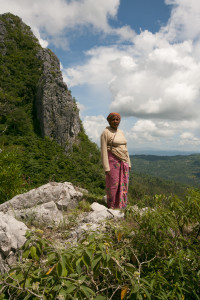
The riches hidden within Timor Island’s lush forests are both extraordinary and problematic. Indigenous people in this part of Indonesia consider the soil, water, stone, and trees their own bodies. Their forest and environment are as essential to their lives as food and air.
But these fertile mountains are also rich in oil, gas, gold, and marble. And companies have long mined the sacred stone without the local people’s consent. More than 15 mines scattered across the island pollute rivers and strip forests bare. Not only are they wiping out tribal lands, but they’re also destroying communities’ identities.
The Mollo people reached their breaking point in 1996, when two companies arrived with plans to explore their most sacred mountain, Bukit Naususu. That’s when Aleta Baun decided she’d had enough.
Protest comes in many forms
Aleta, affectionately known as Mama Aleta, is a mother of three and housewife-turned-activist.
With the support of tribal elders, Mama Aleta started organizing local people to oppose the marble mines. She and three others convinced more than 200 local people to protest. They were successful in forcing the expansion away from their sacred mountain. But still, the mining interests flooded in, threatening even more forest and lives.
The Global Greengrants ConnectionIn 2009, The Samdhana Institute—a member of the Alliance of Funds—in partnership Global Greengrants gave a small grant to Mama Aleta’s organization to bring together three tribes and allies for the first time in an assembly. The gathering was a critical moment in the struggle: The tribes unified into a cohesive front against the mines, and because women in Timor are traditionally responsible for foraging food, plant dyes, and medicine from the mountains, the assembly decided that women needed to be at the forefront of protests. |
The culmination of their struggle wasn’t marked by banners or megaphones. Instead, they resisted with a quiet, peaceful strength that recalled their culture’s deep connection to the environment.
Led by Mama Aleta, more than 150 women spent an entire year sitting on marble blocks at the mine’s entrance, quietly weaving their traditional cloth. While women protested at the mine, the men provided support by cooking, cleaning, and caring for the children.
Despite their peaceful tactics, protesting the mines made members of the movement targets. A price was put on Mama Aleta’s head, and she fled with her children to the forest. There was a violent clash with mining proponents in which she and others were beaten. And she has scars on her legs where she was hacked with a machete.
But the women stayed at the mines, peacefully weaving their traditional fabrics. This unique occupation grew public awareness, and the pressure on the mines mounted. Peaceful resistance was working.
Finally, after more than a decade of struggle, Mama Aleta’s movement successfully pushed out the mining companies. In 2010, the company stopped operations for good.
Of course, mining interests don’t give up easily, and the Mollo people continue to advocate for their rights to their land and a healthy environment. But Mama Aleta’s story is a powerful example of the creativity and innovation that marks women-led movements to protect our planet.
A vision for the future
Mama Aleta’s strength and courage has also become a magnet for funding from a range of organizations and individuals, who now support her nonprofit, Pokja OAT. The Samdhana Institute continues to make grants to protect Timor’s sacred forests, fund sustainable livelihood efforts, monitor mining activity, and support community mapping.
In 2013, Mama Aleta won the prestigious Goldman Environmental Prize for her grassroots work. She used the prize money to set up an advocacy fund to help communities map their forests and document their land rights so that developers can’t claim it without consent.
So what keeps this courageous grassroots leader going in the face of such overwhelming opposition?
“The philosophy of our people is that we regard the Earth as the human body,” Mama Aleta says in this video. “That stone is our bone. Water is our blood. Land is our flesh. And Forest is our hair. If one of them is taken away, we are paralyzed.”
We honor Mama Aleta’s remarkable work and commitment to protecting our environment and, ultimately, life on Earth.
Click here to learn more about the Summit on Women & Climate. And stay up-to-date on women and climate news by following our tweets at #WomenAndClimate.
